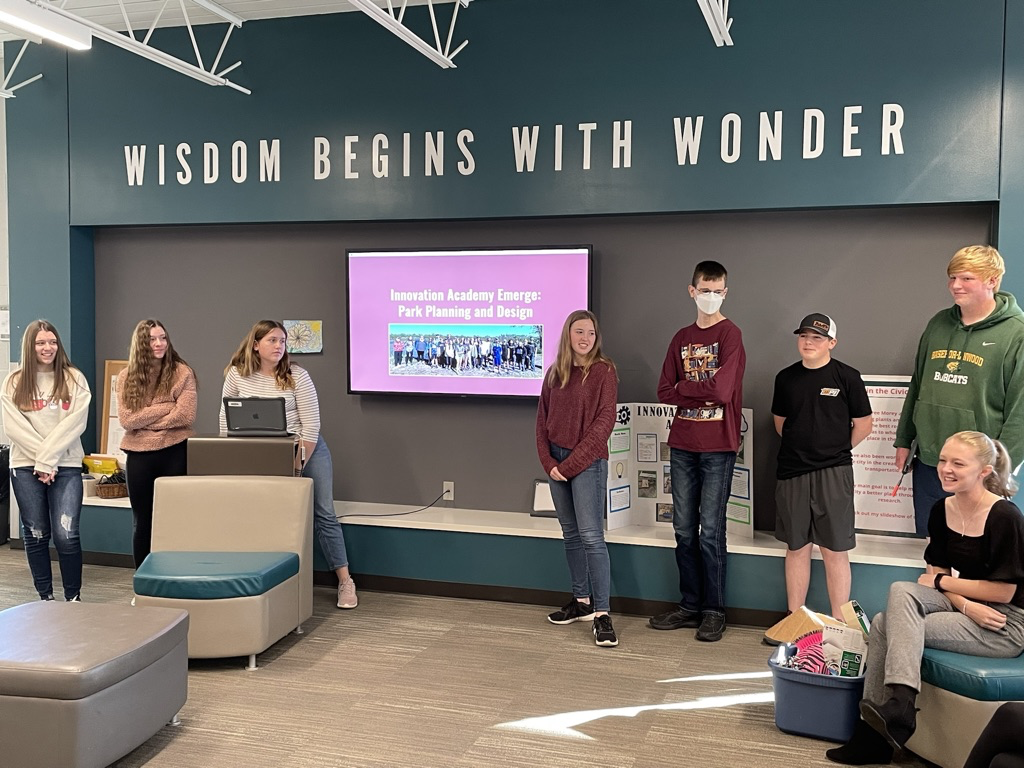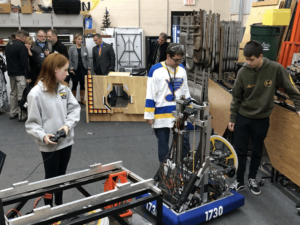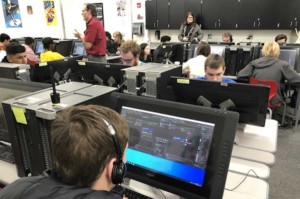How Real World Learning Is Equipping Solutionaries In Kansas City
Key Points
-
Spotting problems, taking initiative, developing solutions, delivering value for a community– these are the most important skills today.
-
The Innovation Academy at Basehor-Linwood High was launched as a chance for juniors and seniors to launch self-directed projects and earn core (English, science, social studies) and career education credit.

“How can we create a just, healthy, and humane world? What is the path to developing sustainable energy, food, transportation, production, construction, and other systems? What’s the best strategy to end poverty and ensure that everyone has equal rights? How can we slow the rate of extinction and restore ecosystems? How can we learn to resolve conflicts without violence and treat other people and nonhuman animals with respect and compassion? The answer to all these questions lies with one underlying system―schooling. To create a more sustainable, equitable, and peaceful world, we must reimagine education and prepare a generation to be solutionaries―young people with the knowledge, tools, and motivation to create a better future.” —Zoe Weil
Spotting problems, taking initiative, developing solutions, delivering value for a community– these are the most important skills today. In her 2016 book, The World Becomes What We Teach, Zoe Weil argues that schooling should be about equipping solutionaries.
The largest regional example of empowering difference-making is the Real World Learning initiative in metro Kansas City where more than 75 high schools on both sides of the state line are encouraging community-connected projects and entrepreneurial experiences (including social impact as well as business opportunity).
Innovation Academy
Heading west of Kansas City, Kansas, past the second beltway is the town of Basehor where high school students are taking on projects that matter to them and their community.
The Innovation Academy at Basehor-Linwood High was launched as a chance for juniors and seniors to launch self-directed projects and earn core (English, science, social studies) and career education credit. Guiding principles of the ala carte program include student choice, embrace the unknown, it’s ok to fail, and community partnerships.
The first class students take is project management where they learn design thinking and skills critical to successful projects. Then students pick a topic of interest and work with a teacher to develop a plan and launch a project. Recent topics have includes peer mentoring for mental health, recycling, mobility for disabled youth, and the physics of movement. (See video.)
Supporting projects in such a wide variety of topics can be a challenge for teachers. Jared Jackson, Director of Innovative Programs for the district, notes the importance of industry and community experts to fill the gaps of project knowledge where teachers are not subject experts.
Spotting problems, taking initiative, developing solutions, delivering value for a community– these are the most important skills today.
Tom Vander ark
This year, Innovation Academy opened to freshmen and 45 students had the opportunity to design a park with the city (eight are pictured above). They engaged the community, considered names, pondered alternative uses, built budgets and developed 3D models. Through deep civic engagement and frequent communication, they earned an English and social studies credit–and they’ll never pass a park again without thinking about the experience they had.
Sion’s Signature Programs
South of Kansas City is an independent Catholic high school for young women where they connect learners with their unique purpose. The goal at Notre Dame de Sion to provide “the tools, support, and skills to explore and make a sustainable impact in our local community and beyond.”
With parents, business partners and universities, Sion identified a beautiful set of nine essential competencies:
- Well-rounded individuals: informed critical thinker, growth-minded learner, confident practitioner
- Faith-filled global citizens: mindful communicator, empathetic perspective taker, Inclusive Community Builder
- Servant leaders: humble difference maker, solution-focused creator, collaborative team player
Nine Sion student leaders are writing a book with a chapter on each of the competencies.
Classroom studies are extended through experiential learning including hands-on community-connected problem-solving. Three-week-long deep dives each year provide immersive experiences including many opportunities to travel.
Leaning into the Sion mission of service, three signature impact programs include:
- Engineering and Ingenuity: a dive into a community issue using engineering and design and problem solving skills.
- Internal Impacts: semester course spent designing impact projects for the Sion community including a recent student-led mental health awareness program and launching a coffee shop.
- Designing Real World Impacts: an upper division offsite English and Social Studies block supporting individual defined community impact projects including serving with refugee teens, restorative justice for prisoners, and addressing the issues of food insecurity.
As Sion learners engage in real world learning, they are encouraged to embrace ambiguity and assert their individuality.
The Innovation Academy at Basehor-Linwood High and Notre Dame de Sion are just two of the dozens of schools creating space and opportunities for students to lead and address problems important to them and their communities. These difference-making projects are engaging and develop the most important skills–for learners and for a better world.
This post was originally published on Forbes.







0 Comments
Leave a Comment
Your email address will not be published. All fields are required.